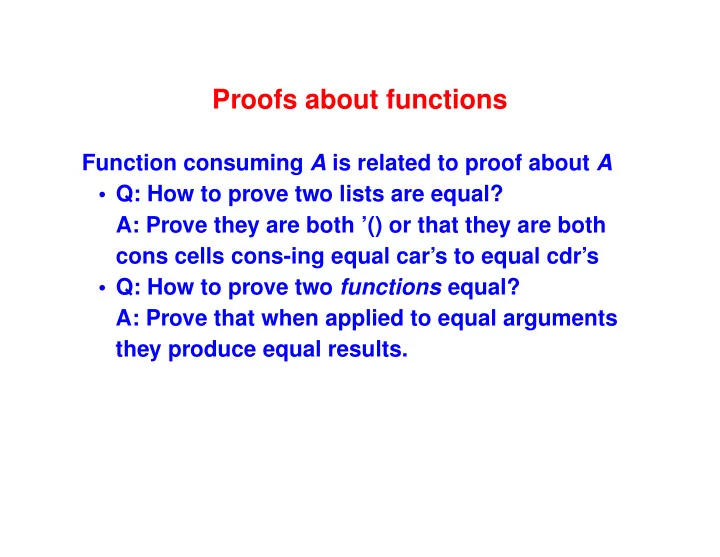

Proofs about functions Function consuming A is related to proof about A • Q: How to prove two lists are equal? A: Prove they are both ’() or that they are both cons cells cons-ing equal car’s to equal cdr’s • Q: How to prove two functions equal? A: Prove that when applied to equal arguments they produce equal results.
What is tail position? Tail position is defined inductively: • The body of a function is in tail position • When (if e1 e2 e3) is in tail position, so are e2 and e3 • When (let (...) e) is in tail position, so is e , and similary for letrec and let* . • When (begin e1 ... en) is in tail position, so is en . Idea: The last thing that happens
Tail-call optimization Before executing a call in tail position, abandon your stack frame Results in asymptotic space savings Works for any call!
Example of tail position (define reverse (xs) (if (null? xs) ’() (append (reverse (cdr xs)) (list1 (car xs)))))
Example of tail position (define reverse (xs) (if (null? xs) ’() (append (reverse (cdr xs)) (list1 (car xs)))))
Reversal by accumulating parameters Moves recursive call to tail position Contract: (revapp xs ys) = (append (reverse xs) ys) Laws: (revapp ’() ys) == ys (revapp (cons z zs) ys) == (revapp zs (cons z ys))
Reversal by accumulating parameters ; laws: (revapp ’() ys) = ys ; (revapp (cons z zs) ys) = ; (revapp zs (cons z ys)) (define revapp (xs ys) ; return (append (reverse xs) ys) (if (null? xs) ys (revapp (cdr xs) (cons (car xs) ys)))) (define reverse (xs) (revapp xs ’()))
Tail position in revapp (define revapp (xs zs) (if (null? xs) zs (revapp (cdr xs) (cons (car xs) zs))))
Tail position in revapp (define revapp (xs zs) (if (null? xs) zs (revapp (cdr xs) (cons (car xs) zs)))) Values xs and zs go in machine registers. Code compiles to a loop.
Are tail calls familiar? In your past, what did you call a construct that 1. Transfers control to a point in the code? 2. Uses no stack space?
Design Problem: Missing Value Provide a witness to existence: (witness p? xs) == x, where (member x xs), provided (exists? p? xs) Problem: What if there exists no such x ?
Solution: A New Interface Success and failure continuations! Contract written using properties (not algorithmic): (witness-cps p? xs succ fail) = (succ x) ; where x is in xs and (p? x) (witness-cps p? xs succ fail) = (fail) ; where (not (exists? p? xs))
From contract to laws (witness-cps p? xs succ fail) = (succ x) ; where x is in xs and (p? x) (witness-cps p? xs succ fail) = (fail) ; where (not (exists? p? xs)) Where do we have forms of data? (witness-cps p? ’() succ fail) = ? (witness-cps p? (cons z zs) succ fail) = ? ; when (p? z) (witness-cps p? (cons z zs) succ fail) = ? ; when (not (p? z))
Coding witness with continuations (define witness-cps (p? xs succ fail) (if (null? xs) (fail) (let ([z (car xs)]) (if (p? z) (succ z) (witness-cps p? (cdr xs) succ fail)))))
“Continuation-Passing Style” All tail positions are continuations or recursive calls (define witness-cps (p? xs succ fail) (if (null? xs) (fail) (let ([z (car xs)]) (if (p? z) (succ z) (witness-cps p? (cdr xs) succ fail))))) Compiles to tight code
Example Use: Instructor Lookup -> (val 2016f ’((Fisher 105)(Hescott 170)(Chow 116))) -> (instructor-info ’Fisher 2016f) (Fisher teaches 105) -> (instructor-info ’Chow 2016f) (Chow teaches 116) -> (instructor-info ’Souvaine 2016f) (Souvaine is-not-on-the-list)
Instructor Lookup: The Code ; info has form: ’(Fisher 105) ; classes has form: ’(info_1 � info_n) � � (define instructor-info (instructor classes) (let ( [s (lambda (info) ; success continuation (list3 instructor ’teaches (cadr info)))] [f (lambda () ; failure continuation (list2 instructor ’is-not-on-the-list))]) (witness-cps pred classes s f))
Instructor Lookup: The Code ; info has form: ’(Fisher 105) ; classes has form: ’(info_1 � info_n) � � (define instructor-info (instructor classes) (let ( [s (lambda (info) ; success continuation (list3 instructor ’teaches (cadr info)))] [f (lambda () ; failure continuation (list2 instructor ’is-not-on-the-list))]) (witness-cps (o ((curry =) instructor) car) classes s f))
Instructor Lookup: The Code ; info has form: ’(Fisher 105) ; classes has form: ’(info_1 � info_n) � � (define instructor-info (instructor classes) (let ( [s (lambda (info) ; success continuation (list3 instructor ’teaches (cadr info)))] [f (lambda () ; failure continuation (list2 instructor ’is-not-on-the-list))]) (witness-cps (o ((curry =) instructor) car) classes s f))
Instructor Lookup: The Code ; info has form: ’(Fisher 105) ; classes has form: ’(info_1 � info_n) � � (define instructor-info (instructor classes) (let ( [s (lambda (info) ; success continuation (list3 instructor ’teaches (cadr info)))] [f (lambda () ; failure continuation (list2 instructor ’is-not-on-the-list))]) (witness-cps (o ((curry =) instructor) car) classes s f)))
Recommend
More recommend